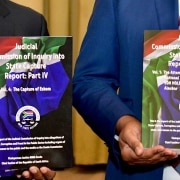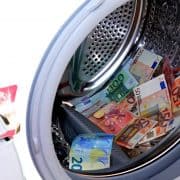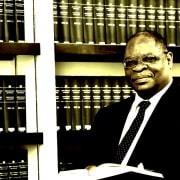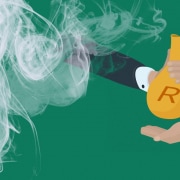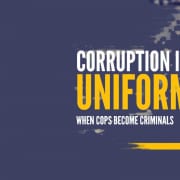|
Getting your Trinity Audio player ready...
|
By Marianne Dodson
First published on The Crime Report
As millions of fans geared up for last weekend’s World Cup final, a new report warned of little prospect that efforts to clean up football corruption inside the Fédération Internationale de Football Association (Fifa) will succeed.
“After more than a century of scandals and a broad array of Potemkin-like reform manoeuvres carefully packaged in pleasant press releases, it is clear that, absent accountability, Fifa will continue to operate as it has, seeking maximum personal profit for those at the top of football,” wrote Bruce W. Bean, a law professor at the Michigan State University-School of Law.
In his report titled Fifa – where crime pays, and which was published in The Palgrave Handbook on the Economics of Manipulation in Sport, Bean offered a sombre assessment of the chances for eliminating the chicanery that has plagued the professional football industry since at least 1974, with the election of Fifa president Joao Havelange (the so-called “father of Fifa corruption“).
The report was unlikely to faze fans of the world’s most-watched athletic event, except possibly for the Olympics, as they prepared for Sunday’s final match between France and Croatia—and it was even less likely to surprise critics who have been calling futilely for reforms for decades.
Money and sport – a dangerous combination
But, in his review of the history of efforts to eradicate Fifa corruption, Bean provided a timely reminder of what happens when huge amounts of money become entangled with sport.
Soccer accounts for almost 40% of the $80-billion in annual revenues from sports worldwide. Fifa reported that it earned $4.8-billion alone for the four-year cycle ending with the 2014 Rio World Cup, with a profit of $2.6-billion.
The organisation’s top executives have reaped personal windfalls as a result. In 2015, Fifa’s president earned a salary of $3.9-million, and the general secretary went home with $2.2-million.
The extraordinary wealth has contributed to giving Fifa “the impunity of a sovereign, rogue nation,” Bean wrote.
As one example, ahead of the 2014 World Cup in Brazil, Fifa successfully demanded the country change its 10-year-old law banning the sale of alcohol at football matches for the event.
Swiss law protects Fifa and others
But its vast global reach is also what makes prosecuting Fifa executives so difficult. Fifa is organised under the Civil Code of Switzerland, but it has had presidents from seven different countries.
Bean notes the Swiss government has not been co-operative in prosecuting corruption allegations, often claiming that its reach cannot extend to criminal activities in other countries—a reluctance that Bean said has earned it the well-deserved title of the “Nirvana for Sports Criminals.”
A series of reports and initiatives have been formulated to try to amend the corruption evident within the Fifa organisation—with limited success.
An independent governance committee (IGC) was established in 2011 to assess Fifa’s response to allegations of corruption in the past, and to make recommendations going forward. The makeup of the committee was not entirely independent, as was intended, and involved Fifa paying committee members $5 000 a day for their work.
The IGC published its first report in March 2012, which included recommendations to create an audit and compliance committee, add independent chairs for independent committees, and establish term limits for Fifa executive members, amongst others. The IGC said in this report that Fifa’s co-operation with the investigation left a lot to be desired.
“Overall, the answers by Fifa regarding the handling of alleged misconduct were not fully satisfactory to the IGC,” the report, cited by Bean, said.
“Based on the discussion of specific examples, Fifa has—in the opinion of the IGC—shown a lack of proactive and systematic follow-up on allegations.”
The IGC released a final report in 2014 saying it was concerned about how seriously senior Fifa officials were taking the recommendations, adding that an outside, independent body should continue to work with Fifa to help enact reform.
Covering up corruption
Near the end of 2014, the chair of the Investigative Chamber of the Ethics Committee, Michael Garcia, submitted the Garcia Report to Hans-Joachim Eckert, Fifa’s head of adjudication of ethical matters. The 450-page report was withheld from the public in lieu of a 42-page summary prepared by Eckert.
Eckert’s report concluded that the 2018 and 2022 World Cup locations were not chosen on the basis of bribery—which was a hotly contested discussion—and that cash was not given to voting members in exchange for votes. Garcia responded by demanding the publication of the full report, and then resigning after his demand was not met.
In fact, half of the 22 Fifa executive committee members who voted in 2010 to choose Russia as the site of the 2018 World Cup, have been accused of corruption related to the process.
In 2015, the Americans became involved in the “cesspit of corruption” when US Attorney General Loretta Lynch revealed a 47-count indictment charging football officials from CONCACAF, the Caribbean, Central and North American Confederation, and from CONMEBOL, the South American Confederation, with numerous crimes involving kickbacks and bribery amounting to $150-million.
But that only earned criticism of the US for involving itself in the football world, with Russian President Vladimir Putin saying it was an attempt to “extend US jurisdiction to other states.”
By the end of 2017, 24 out of 26 defendants being tried in the US had pled guilty.
But the lesson drawn by Bean is that only the Swiss government has the legal authority and clout to end Fifa’s pattern of corruption.
Switzerland, which is home to at least 65 international sports organisations, should apply its own rules of corporate governance to the association, amending them as necessary to exert jurisdiction over Fifa’s worldwide activities, wrote Bean.
“The football world deserves an honest Fifa,” he wrote. “Switzerland must pioneer the way to bring accountability to so-called not-for-profit entities.”
• Image: Kremlin.ru

